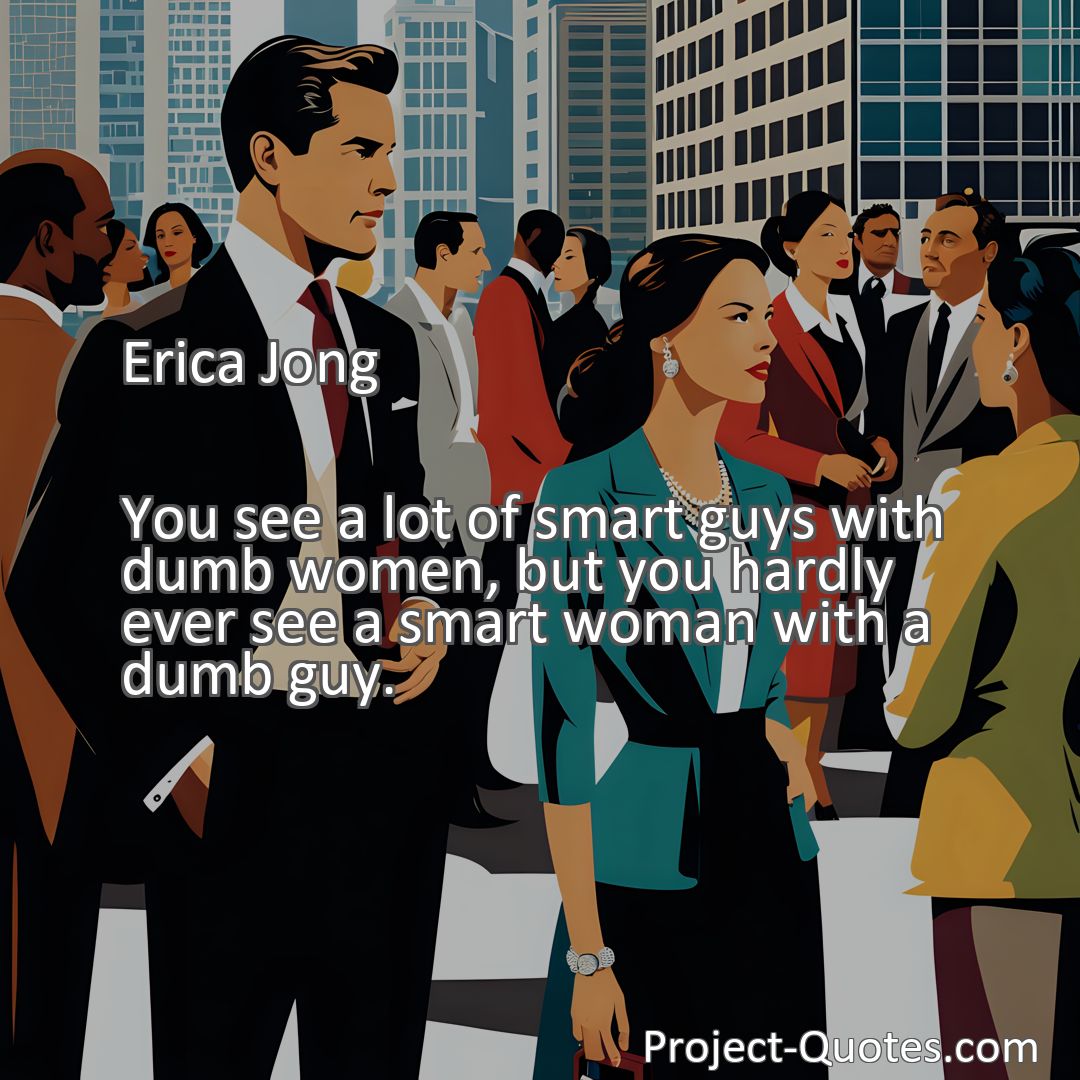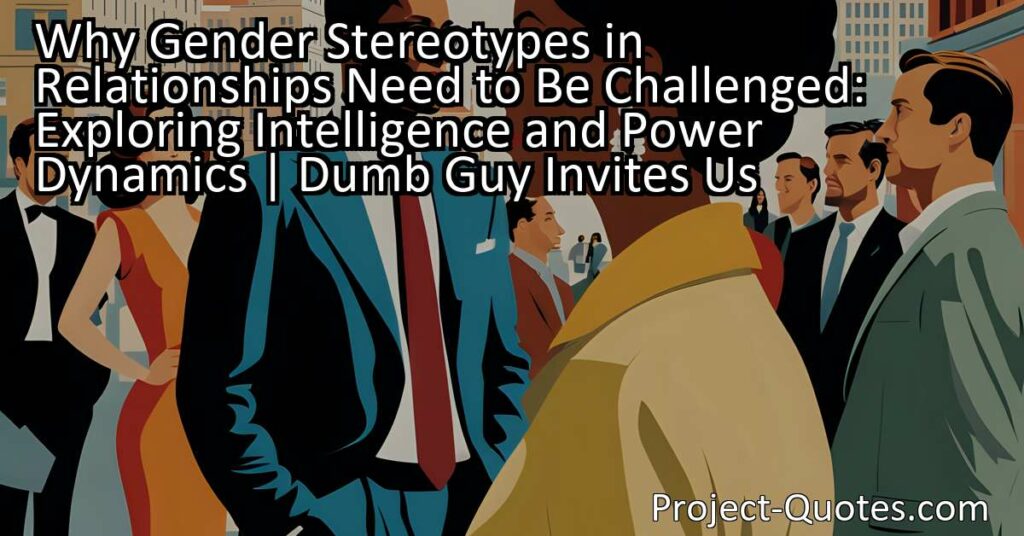You see a lot of smart guys with dumb women, but you hardly ever see a smart woman with a dumb guy.
Erica Jong
The title “Why Gender Stereotypes in Relationships Need to Be Challenged: Exploring Intelligence and Power Dynamics” invites us to reflect on the dynamics of relationships, particularly concerning intelligence and power. Erica Jong’s quote, “You see a lot of smart guys with dumb women, but you hardly ever see a smart woman with a dumb guy,” sparks thought on societal norms, gender roles, and personal preferences. However, it is important to approach this topic with an open mind, rejecting gender-based biases and prioritizing emotional connection, mutual respect, and shared values in relationships.
Table of Contents
Meaning of Quote – You see a lot of smart guys with dumb women, but you hardly ever see a smart woman with a dumb guy.
In the world of relationships, it’s not uncommon to come across couples where one person seems to possess more intelligence or intellectual prowess than the other. Erica Jong, a renowned author, raises an interesting perspective on the dynamics of these relationships through her thought-provoking quote, “You see a lot of smart guys with dumb women, but you hardly ever see a smart woman with a dumb guy.” While this statement may initially strike some as controversial or biased, diving deeper into its meaning can shed light on societal norms, gender roles, and personal preferences.
To begin understanding this quote, it’s important to acknowledge that intelligence is a multifaceted trait encompassing various forms of knowledge, problem-solving abilities, and critical thinking skills. Additionally, it’s crucial to remember that intelligence cannot be measured accurately by a single metric or test; instead, it is a complex interplay of innate abilities, education, experiences, and interests.
Jong’s observation could be explained in part by historical and societal norms that have influenced traditional gender roles. For centuries, women were systematically marginalized and excluded from formal education and certain professions, which limited their opportunities for intellectual growth. As a result, cultural expectations and stereotypes often portrayed women as intellectually inferior to men. These ingrained biases may have led to the perpetuation of relationships where the man is seen as the “smarter” partner, despite the actual intelligence levels of both individuals.
However, it is essential to note that intelligence is not limited to formal education or book smarts; emotional intelligence, creativity, and various forms of intelligence are equally valuable. Putting aside societal expectations, it’s crucial to recognize that intelligent women exist in abundance. Over the years, there has been a considerable shift in societal values and opportunities for women, leading to increased educational and professional achievements. Women have risen to positions of power across countless fields, challenging the outdated notions that they are inherently less intelligent than men.
Considering these changes over time, the observation made by Jong may carry less weight in today’s society. It is crucial to recognize that intelligence does not solely define the success or worth of an individual, nor should it determine the dynamics of a relationship. True compatibility and love are not dictated by intelligence alone; instead, they involve shared values, emotional support, mutual respect, and common goals.
Furthermore, intelligence in a relationship can manifest differently for different individuals. It is entirely possible for a person with extraordinary intellectual capabilities to be attracted to someone who possesses different qualities or strengths. Love and connection often go beyond one’s IQ level, focusing on spiritual, emotional, and personal compatibility.
Rather than focusing solely on intelligence, it is more important to evaluate how partners interact, communicate, and support each other’s growth. Intellectual compatibility plays a role in fostering stimulating conversations and shared interests but should not be seen as the sole predictor of a successful relationship. Emotional harmony, kindness, empathy, and shared values are equally, if not more, important factors that contribute to a healthy and fulfilling partnership.
In addition to personal preferences and compatibility, the idea of power dynamics may also be at play when considering Jong’s observation. Historically, men have often held more power and control in relationships due to societal expectations and gender norms. However, with the progress of gender equality movements, power dynamics have begun to shift. As women continue to gain equal footing in various aspects of life, it becomes increasingly likely to witness partnerships where both partners possess equal intellectual capacities.
Ultimately, relationships are complex and multifaceted, and assigning a single metric, such as intelligence, to determine their success or failure is overly simplistic. To truly understand the dynamics of a relationship, it is necessary to consider the multitude of factors that contribute to emotional connection, support, and shared experiences. Intelligence, though valuable, is just one aspect of the vast tapestry that makes up a fulfilling partnership.
As society progresses, it is essential to challenge and dismantle any remnants of gender biases and stereotypes that may inadvertently influence our perceptions of relationships. Embracing diversity in intelligence, strengths, and interests is vital in ensuring that individuals can form authentic connections based on genuine compatibility rather than societal expectations or superficial judgments.
In conclusion, Erica Jong’s quote, “You see a lot of smart guys with dumb women, but you hardly ever see a smart woman with a dumb guy,” invites us to explore the dynamics of relationships in terms of intelligence and power dynamics. However, it is crucial to approach this subject with an open mind, acknowledging the complexity of intelligence and rejecting any gender-based biases. Relationships should be about mutual respect, emotional support, and shared values, with intelligence acting as just one aspect of compatibility. Ultimately, it is the emotional connection and personal growth that should be prioritized in any partnership, rather than rigid notions of intelligence or gender roles.
I hope this quote inspired image brings you hope and peace. Share it with someone who needs it today!


